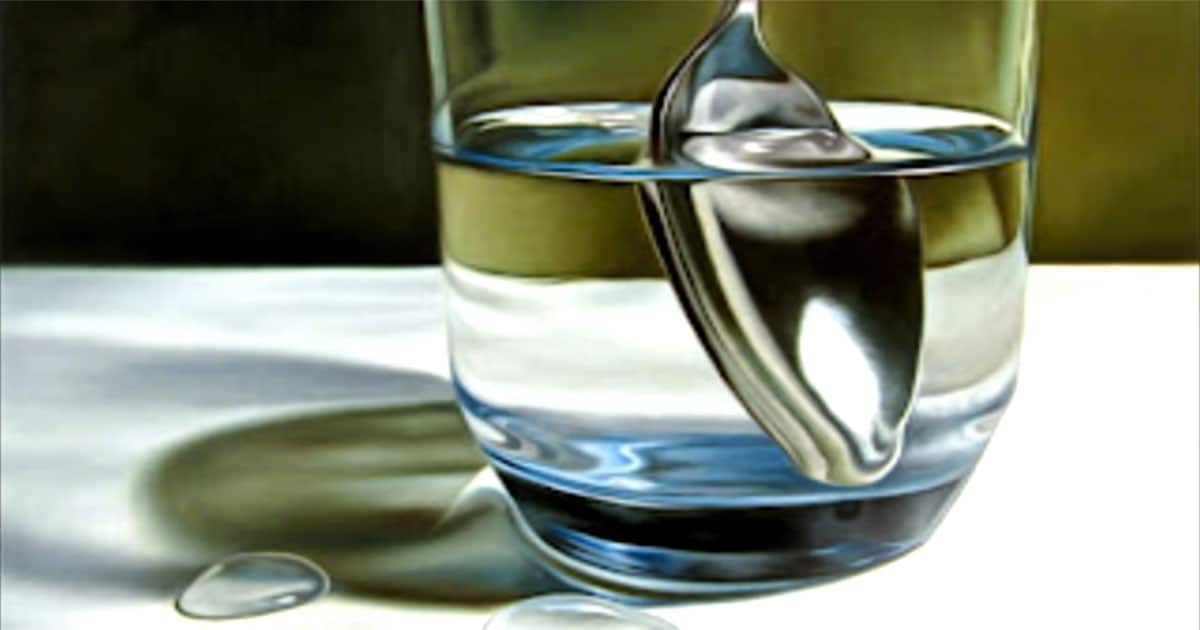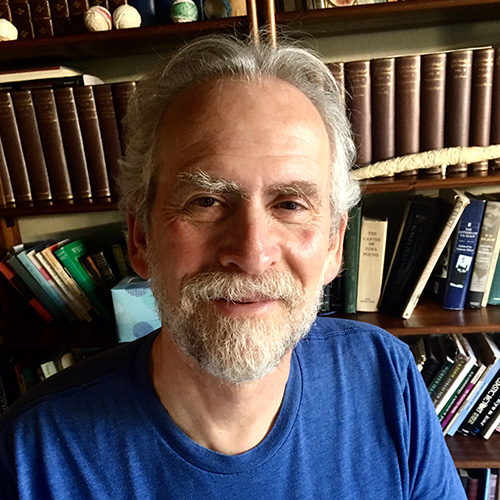GEORGE FRANKLIN
★ ★ ★ ★
POETRY

Agua
For Ximena Gómez
Am I any closer to knowing you here, where you grew up—
One of three sisters, like in Chekhov—in a valley hugging
The Cauca River, mountains blue as rain in the distance?
Upstairs at the nursing home, your father grows thinner,
And you give him water by the spoonful, so he won’t choke. He
Calls you mijita and asks you to close the window. His
Face has shrunk to bones and cartilage. His eyes are large and
Searching. There are neighborhoods in Cali where you walked,
Looking at birds and bougainvillea, the impenetrable green
Of the future. We haven’t had time to see the places you lived,
For you to tell me what you fantasized as you stepped over
Cracks in the sidewalk, dodged traffic. The first days we were
Here, your father learned my name, but now he’s forgotten it.
He thinks I’m “Jaime” and can’t be convinced otherwise. Will
We all end up like this? In the garden below, there are birdsongs
I don’t recognize, but plants that I do: heliconia and bird of
Paradise, ginger blossoms red as candy and that kind of ginger
With the white blossoms too. Yesterday, there was a huge cat
Observing everything, and a turtle that stopped to look at me
Reading, then strolled off, scratching his small black nails
Against the concrete. I didn’t get a chance to introduce myself.
When you leave the place you were raised, it ceases to exist, and
You cease to exist in the same way. The signs are changed
Above the shops, the highways become more crowded. Now,
Everyone has motorcycles. I imagine you reading Freud in
That massive library or maybe Spinoza, your thoughts drifting
To coffee and dancing salsa with your friends, or listening to
Estanislao Zuleta disparage his contemporaries. How far is it
From Colombia to Miami, to your apartment in Midtown, to
Translating the narratives of immigrants asking for asylum—
Venezuelans who don’t want to be sent back to die or
To beg in the streets of Cali or some other place? Yesterday,
We saw families by the side of the road to Pance, with nothing,
Stopping here or headed farther south. Men with cardboard signs
At the intersections, asking for pesos. But, none of this brings me
Closer to you. At night in our room, we touch each other, carefully,
And then with hunger, fingers and mouths unrestrained, thighs open,
Looking for what? I’ve never figured this out. The room smells
Vaguely of cigarettes, but we’re showered, our skin damp and cool.
Your father is probably dozing. There is not much left you can say
To him now. The water you give him is a kind of sacrament,
A way of preparing for a time when preparation doesn’t matter,
Preparing you for continuing. When you leave, he will cease to
Exist, and you will also in the way you existed before.
His wrists and hands are transparent. He reaches for the cup you
Can’t give him. You remind him, one spoon, then another.
He gags, coughs, swallows the fluids that fill his throat, takes
A shallow breath, asks for more water. Tomorrow, we will fly back
To Miami. The residents of the home will be eating dinner, watching
Television, voices, music in the background, unaffected by the heat,
The mosquitoes that come around in the evening. Your father will
Lie in bed, waiting for sleep to cover him, his mouth dry. On the plane,
I’ll touch your hand, then bring it to my lips. Forgive me, mi amor, for
Knowing so little, for not even knowing what it is I want to know.
Caffè Corretto
Wet cold from the Adriatic, the
Dolomites’ jagged shadows on the
Horizon. On the dock, I can smell
Salt water and rust, hear the creaking
Of brine-soaked wood when the waves shove at
The pilings. Earlier, there might have
Been fog thick enough to make islands
Disappear. But, I wasn’t awake.
A baker’s left rolls by the locked door
Of a café. The owner opens
Quickly and takes them inside. When he
Turns the sign around, I walk in and
Stand at the counter, ordering a
Caffè corretto, espresso mixed
With grappa. The warmth starts at my belt,
Then it moves out toward my hands, feet.
Carts pass outside, picking up garbage.
The sounds of the market grow louder.
I stop and remind myself that this
Isn’t real. It’s a memory from
Years ago, still bright as an orange
Raincoat displayed in a shop window,
Or morning sunlight reflected on
A kitchen table. I love this place,
But maybe I love it because I
Don’t live here, because it’s not where I
Work, because I imagine my life
Floating on top of it like a hat
Somebody’s lost in the water, caught
By a current before it could be
Retrieved. Underneath a stone archway,
An art gallery sells glass sculptures,
Paintings with blobs of red and yellow,
Posters from last year’s exhibitions.
If this were real, I’d stop and look. I’d
Browse in some store that sold wool sweaters,
Elegant ties, or that suede jacket
I’ve always wanted. Just out of reach,
The lost hat floats down a canal, caught
In the stream, pushed one way, another,
But always moving away from where
I’d planned to go. For an instant, the
Wind moves it toward me. I reach out, grab.
Yellow Peaches from Chile
In the parking lot of Whole Foods, the women’s blouses are the colors of carnations and marigolds. They hold the hands of their distracted children, guide their shopping carts toward cars whose trunks pop open with the press of a pink thumbnail against a key.
Holding grocery bags in both hands, the men wear black t-shirts as though it’s a political statement. They close the tailgates of their SUVs with measured force, and dark glasses dangle from their necks like relics.
A brown-haired woman in a green apron speaks Spanish to her daughter on a cell phone. Her shift won’t be over for three more hours. Someone calls her to come to the grocery aisle by the applesauce. She gets up, takes a deep breath, goes back inside.
I notice that there are five different kinds of bananas over by the potatoes and the onions.
Who buys all this cheese?
At the olive bar, I see those little red peppers that are sweet and hot at the same time. I had them on pizza once in Arlington, Virginia.
At the supplements and soaps, the sales assistant has purple hair. Where, someone asks, is the acidophilus?
It’s hard to leave without buying something, so I settle on a muffin and coffee, taking it outside to look at the afternoon sky, the white half-moon visible in daylight.
I break the muffin in half and take bites in between sips of coffee. Why is it so difficult to remember that none of us live forever?

George Franklin’s most recent collection, Traveling for No Good Reason, won the Sheila-Na-Gig Editions competition and was published in 2018. A bilingual collection, Among the Ruins / Entre las ruinas, translated by Ximena Gomez was also published in 2018 by Katakana Editores, and individual poems have appeared in various journals, including The Wild Word, B O D Y, The Threepenny Review, and Cagibi. He practices law in Miami and teaches poetry workshops in Florida state prisons.

DEAR READER!
At The Wild Word we are proud to present some of the best online writing around, as well as being a platform for new and emerging writers and artists.
As a non-profit, the entire site is a labour of love.
If you have read the work in The Wild Word and like what we do, please put something in our tip jar to keep this amazing platform alive.
THANK YOU FOR YOUR SUPPORT!
























George – I was especially moved by this section of your first poem – beautiful work!
The water you give him is a kind of sacrament,
A way of preparing for a time when preparation doesn’t matter,
Preparing you for continuing. When you leave, he will cease to
Exist, and you will also in the way you existed before.
His wrists and hands are transparent. He reaches for the cup you
Can’t give him. You remind him, one spoon, then another.
George – I was especially moved by this section of your first poem – beautiful work!
The water you give him is a kind of sacrament,
A way of preparing for a time when preparation doesn’t matter,
Preparing you for continuing. When you leave, he will cease to
Exist, and you will also in the way you existed before.
His wrists and hands are transparent. He reaches for the cup you
Can’t give him. You remind him, one spoon, then another.
Wendy–
Thank you so much. I think sometimes that things that happen write the poem for you.
All best,
George
If there are duplicate replies here, I apologize. Computer glitches.
Wendy, thank you! I’m glad you liked the poem. Sometimes things that happen write the poem for you. This was one of those times.
Best,
George
George – Your poems are exquisite. Once again the details, at once both vague and deep, take me to different realities of very common places. You are an excellent writer. Congratulations.
Hi, Susana D–
Thank you for your comment. It’s funny you mention “common places.” I’ve been thinking a lot about that lately. Places certainly seem common if you live there, but when they’re new to you, they’re exciting and beautiful. This poem came out of a trip to Cali, Colombia, a place that fascinates me.
All best,
George
Oops. Susana D, I realize you were probably writing about “Yellow Peaches…,” and I was thinking about “Agua.” Yes, I think it all has to do with how we approach the places we live in. There is those amazing lines from William Carlos Williams’ “January Morning”:
I have discovered that most of
the beauties of travel are due to
the strange hours we keep to see them:
the domes of the Church of
the Paulist Fathers in Weehawken
against a smoky dawn—the heart stirred—
are beautiful as Saint Peters
approached after years of anticipation.
Thank you for your stories, George. And for taking me to South America again.
I’ve spent a lot of time in Argentina over 15 years (the Buenos Aires area) & a little in Uruguay.
My poem “La Gorda” is here too. (You may find a typo in the link.) Nice to share with you.
Franci, I loved “La Gorda.” I often joke that I’m becoming “el gordote.” I guess I have to go to more yoga classes. Nice to share with you as well.